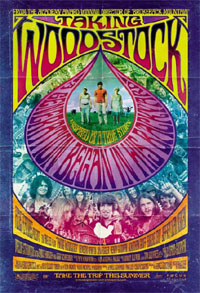 TAKING WOODSTOCK
TAKING WOODSTOCK(R)
** (out of 5)
August 28, 2009
STARRING
Demetri Martin as ELLIOT TEICHBERG
Imedla Staunton as SONIA TEICHBERG
Henry Goodman as JAKE TEICHBERG
Jonathan Groff as MICHAEL LANG
Emile Hirsch as BILLY
Liev Schrieber as VILMA
Studio: Focus Features
Directed by: Ang Lee
BY KEVIN CARR
Listen to Kevin’s radio review…
Like so many movies I’ve seen of late, a film like “Taking Woodstock” just isn’t for me. That doesn’t mean that it’s a bad movie necessarily. It’s just not something that I can connect to or relate to in any way.
You see, I’m a child of the 80s, when the most influential thing about the 1960s was a healthy dose of nostalgia from my teachers in high school. They may have lived through the Woodstock era, but I wasn’t even born when this historic three days of peace, love and music happened.
Even though I spent a good chunk of my early adult life, including my college years, surrounded by people who wanted to relive the 60s, I just never got into it. Sure, the music was cool, but I wasn’t the type to smoke pot or drop acid, and I wore my hair short and insisted on bathing regularly. No one ever accused me of being a hippie.
However, if you were (or are) a hippie, you are going to flat-out love “Taking Woodstock.” The film tells the story of Elliot Teichberg (Demetri Martin), a teenage community leader in upstate New York who uses his influence to bring the Woodstock music festival to his home town. Elliot is in for a lot of hassles as he tries to secure the permits, the right to use the land and the fact that the festival grew to monstrous proportions.
“Taking Woodstock” gives us an inside glimpse at the legendary music festival that people my age have only heard about. It shows how the event was put together from the inside out, and we get to see how things came together and why everything blew up. In fact, there’s very little shown about the actual music festival part of the show. Rather, “Taking Woodstock” is a character study into Elliot and how he deals with overbearing parents and a sudden rise in popularity.
In this respect, if you’re hoping for a two-hour recreation of Woodstock with all the awesome music of 1969, you’ll be disappointed. In fact, there’s very little time spent at Woodstock itself, and we only get to see the stage from a far, far distance (which I am certain was how most of the attendees saw it). This is an interesting angle because the viewer can grasp the scope of the event rather than focus on the stage, which so few people even got near.
But for me, I was bored with the film. Sure, it was interesting to see how Elliot dealt with all of his problems, and I appreciated the fact that “Taking Woodstock” showed the behind-the-scenes problems, including dealing with money and contracts – which most people don’t associate with Woodstock at all.
With all that said, there was one performance in the movie that is worth plenty of praise. Liev Schreiber turns out a hilarious and strangely heartwarming performance as the Korean war vet, cross-dressing head of security Vilma. Schreiber shines in this role, but sadly most of the cast attention has been going to Emile Hirsch, who plays nothing more than a retread of his part from “Into the Wild.”
Still, in the end, “Taking Woodstock” was nothing more than a glorification of the event (which is nothing new in this day and age), idolizing the hippie lifestyle. Looking back on the event through the camera lens, it should have been called “Three Days of Peace, Love, Music and Filth.” I find it hard to believe that everyone didn’t go home with a sizzling case of hepatitis after the mudbath that it turned into. I needed to take a shower after just watching the film.
I guess this is me being a bit of a fuddy-duddy, considering I have almost always considered the overly introspective, pseudo-intellectual nature of the hippie movement to be rather silly. By the end of the film, I was hoping that Eric Cartman would come through with his “pest control” army.
Podcast: Play in new window | Download
